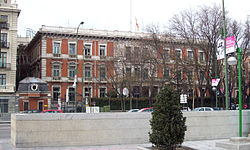History
This Ministry was first created in 1979 after the approval of the Constitution of 1978 in order to adapt the centralized administration to the new decentralized territorial administration. At the beginning, it assumed the relations with the already formed regions, the regions in process of formation and the local administration. [2]
Previously, between 1977 and 1979 there was the figure of the Assistant Ministry of the Regions which, led by Manuel Clavero, developed the pre-autonomy agreements of the various regions and nationalities of Spain. [3]
Initially it was endowed with a small structure, composed of a Undersecretariat, a Technical General Secretariat and two Directorates-General: Cooperation with Autonomous Regimes and Local Cooperation, this last transferred from the Ministry of the Interior. [4]
In the words of Prime Minister Adolfo Suárez before the Congress of Deputies on 18 April 1979:
The Deputy Minister for the Regions has been removed in order to create from the Ministry of the Interior a new Ministry for Territorial Administration of the State that has clear and specific competences, completely absent from any other relationship with matters of public order in the relations with the City Councils, in the relations with the Provincial Councils and in the relations with the Autonomous Communities, from the perspective of the constitutional mandate of the autonomies that correspond to each one of these
One year later, and with the aim of strengthening the administrative structures that facilitated the process of devolution to the Autonomous Communities, the Secretary of State for the Autonomous Communities, the Secretary of State for Local Corporations and the Directorate-General for Autonomic Development were created.
After the arrival of the Socialist Workers' Party to the Government, in 1983 the Ministry was again the object of remodeling. The Secretary of State for Local Corporations disappeared and four Directorates-General were established: Autonomic Development; Cooperation with the Autonomous Communities; Local Management; and Local Cooperation.
The great reshuffle took place, nevertheless, in 1986, when the department was renamed «for the Public Administrations» and receives powers on Civil Service and Administrative Modernization that until that moment exerted the Ministry of the Presidency. [5]
A new extension of powers took place in 1997, as a consequence of the approval of the Law 6/1997, of April 14, of Organization and Functioning of the General State Administration, which organically assigned to it the Government Delegations (until then dependents from Interior).
These three areas of activity (Relationship with Autonomous and Local Administrations, Civil Service, and coordination of the Government Delegations) have remained as the competence axis of the department, except for the period 2009–2010, in which the last two passed temporarily to the Ministry of the Presidency. These three areas of work (Relations with Autonomous and Local Administrations, Civil Service, and coordination of the Government Delegations) have remained as the responsibilities axis of the department, except for the period 2009–2010, in which the last two passed temporarily to the Ministry of the Presidency.
Since December 22, 2011, the powers of this department have been integrated in the Ministry of the Treasury, which was renamed the Ministry of the Treasury and Public Administration. All its functions were assigned to the Secretary of State for Public Administrations. In 2016, the functions of relations with the regions and local administrations were transferred to the Presidency Ministry and it wasn't until 2018 that this Ministry was recovered assuming all of its historic responsibilities. [6]


































